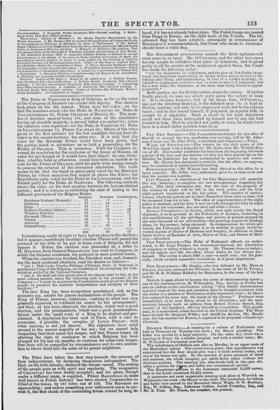The Duke de NEMOURS is King of Belgium, as far
as the votes of the Congress at Brussels can confer that dignity. The election took place on the 4th instant. There were two votes ; on the first the numbers stood—for the Duke de NEMOURS 89, Duke de LEUCHTENBERG 67, Prince CHARLES of Bavaria 35. The num- ber of deputies present being 191, and none of the candidates -having an absolute majority, a second ballot was called for ; when the numbers were reported—for the Duke de NEMOURS 97, Duke de LEUCHTENBERG 74, Prince CHARLES 20 ; fifteen of the.votes given in the first instance for the last candidate having been di- vided in the second between the other two. It is said that the votes for the Bavarian Prince would have been given, had the parties dared to adventure on so bold a proceeding, for the Prince of ORANGE. This is nonsense. Until the Congress re- versed its resolution for the exclusion of the house of Nassau, all votes for any branch of it would have been illegal: no one, there- fore, whether bold or otherwise, would have been so foolish as to vote for the Prince of ORANGE, until his party were strong enough to procure the reversal of the obnoxious resolution. The truth seems to be, that the timid or peace party voted for the Bavarian Prince, by whose accession they hoped to please the Allies ; the Republican party voted for the Duke de LEUCHTENBERG, and the French party for the Duke de NEMOURS. The following analysis shows the votes on the first scrutiny between the last-mentioned parties ; and it is curious as exhibiting the state of feeling in the diffeient provinces of the Belgian States.
Deputies. Nemours. Leuchtenberg.
Southern Brabant (Brussels) .... 27 7 7.
Limburg .. 17 10 5 Liege , 19 11 5 Eastern Flanders (Ghent) 35 12 19 Western Flanders 29 2 17 Hainault (Mons) 30 20 7 Namur' 10 9 1 Antwerp 18 5 4 Luxembourg 16 ... . 13 2 200 89 67
Luxembourg ought of right to have had no place in the election ; but it appears exceedingly doubtful whether France will permit the protocol of the 20th to be put in force, even if Belgium did not oppose it. Before the election was proceeded in, a letter to M. BRESSON, from General SEBASTIANI, was read to Congress, in which the General condemns the protocol in most pointed terms. When the election was finished, the President rose, and, demand- ing the most profound attention, read the decree as follows—
"Art. 1. That Louis Charles Philippe d'Orleans, Duke of Nemours, is proclaimed King of the Belgians, on condition of his accepting the Con- stitution settled by the National Congress. "Art. 2. He shall not take possession of the throne until he has, in the most solemn manner, taken the following oath in the presence of the Congress:—' I swear to maintain the Constitution and laws of the Belgian people, to preserve the national independence and integrity of their territory."
The new King has been everywhere proclaimed, and, as the accounts say, amidst the joyous acclamations of the people. The King of France, however, continues, contrary to what was very generally expected, to withhold his assent to the arrangement ; and-thus, as has been observed, the election, which was a good election, and the proclamation, which was a good proclamation, labour under the small want of a King to be elected and pro- claimed. • A deputation has been sent to Pa:ris; with a- view to overcome, if possible, the scruples of Louis PHILIP; with what success, is not, yet known. His objections have solid ground in the narrow majority of his son ; but we cannot help suspecting that their cause lies deeper, and that France hopes, by allowing the state of confusion in which Belgium has been plunged for the last six months, to continue for some time longer, that state will be compelled by circumstances and its own inclina- tion to throw itself into the arms of its potent neighbour.


























 Previous page
Previous page